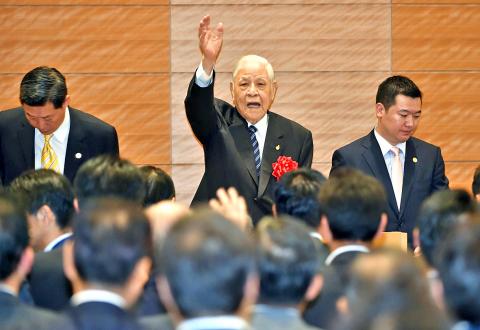Former president Lee Teng-hui (李登輝) delivered a speech to hundreds of Japanese lawmakers at the Diet building in Tokyo yesterday, saying Taiwan is in immediate need of a second democratic reform to smooth its passage into a full-fledged democracy.
Titled the “Paradigm Shift of Taiwan,” the speech made Lee the first Taiwanese politician to address the Diet and marked Lee’s seventh visit to Japan since he left office.
Lee said that Taiwan underwent the first democratic reform during his time in office, and the nation has since become an embodiment of the Asian transition to democracy.

Photo: AFP
Lee said that Taiwan was under foreign rule for hundreds of years until the first direct presidential election in 1996.
Taiwanese disagree with the “one China” policy and the claim that “Taiwan is a part of China” as China has repeatedly stressed, he said.
To maintain the long-term stability of Taiwan, “the ambiguous relationship between Taiwan and China that has spanned more than half a century must be clarified,” Lee said.
He said Taiwan experienced a paradigm shift from the “ethnic conflict under the rule of a dominant minority” to the “coexistence of multiple ethnic groups” between the 1980s and the 1990s, when the nation saw a long-lasting economic boom and fair distribution of wealth, which Lee described as the first democratic reform in Taiwan.
However, that reform has reached its limit, and the call for a second wave of reforms — including constitutional reform — is increasingly urgent, especially among young people, Lee said.
Although direct presidential election are codified in the Constitution, there is no provision in the Constitution to limit presidential power, and it depends solely on the presidents themselves to exercise self-restraint and not to abuse their power, he said.
“I am 92 years old, and there might be only five more years for me at most to do something for Taiwan,” Lee said, adding that he would devote the rest of his life to the nation.
Saying that both Taiwan and Japan define democracy and liberty as their highest values, he said that he would like to see the two nations join hands to make a contribution to the world, as well as Japan’s sustained support for Taiwan.
Responding to a question raised by a Diet member in a closed-door question-and-answer session on “what Japan is lacking,” Lee said: “The spirit of Bushido [“the way of the samurai”] is universally true, and Japan could lead the world if it lives up to that standard, especially honesty and earnestness as commanded in Bushido.”

‘ABUSE OF POWER’: Lee Chun-yi allegedly used a Control Yuan vehicle to transport his dog to a pet grooming salon and take his wife to restaurants, media reports said Control Yuan Secretary-General Lee Chun-yi (李俊俋) resigned on Sunday night, admitting that he had misused a government vehicle, as reported by the media. Control Yuan Vice President Lee Hung-chun (李鴻鈞) yesterday apologized to the public over the issue. The watchdog body would follow up on similar accusations made by the Chinese Nationalist Party (KMT) and would investigate the alleged misuse of government vehicles by three other Control Yuan members: Su Li-chiung (蘇麗瓊), Lin Yu-jung (林郁容) and Wang Jung-chang (王榮璋), Lee Hung-chun said. Lee Chun-yi in a statement apologized for using a Control Yuan vehicle to transport his dog to a

Taiwan yesterday denied Chinese allegations that its military was behind a cyberattack on a technology company in Guangzhou, after city authorities issued warrants for 20 suspects. The Guangzhou Municipal Public Security Bureau earlier yesterday issued warrants for 20 people it identified as members of the Information, Communications and Electronic Force Command (ICEFCOM). The bureau alleged they were behind a May 20 cyberattack targeting the backend system of a self-service facility at the company. “ICEFCOM, under Taiwan’s ruling Democratic Progressive Party, directed the illegal attack,” the warrant says. The bureau placed a bounty of 10,000 yuan (US$1,392) on each of the 20 people named in

The High Court yesterday found a New Taipei City woman guilty of charges related to helping Beijing secure surrender agreements from military service members. Lee Huei-hsin (李慧馨) was sentenced to six years and eight months in prison for breaching the National Security Act (國家安全法), making illegal compacts with government employees and bribery, the court said. The verdict is final. Lee, the manager of a temple in the city’s Lujhou District (蘆洲), was accused of arranging for eight service members to make surrender pledges to the Chinese People’s Liberation Army in exchange for money, the court said. The pledges, which required them to provide identification

INDO-PACIFIC REGION: Royal Navy ships exercise the right of freedom of navigation, including in the Taiwan Strait and South China Sea, the UK’s Tony Radakin told a summit Freedom of navigation in the Indo-Pacific region is as important as it is in the English Channel, British Chief of the Defence Staff Admiral Tony Radakin said at a summit in Singapore on Saturday. The remark came as the British Royal Navy’s flagship aircraft carrier, the HMS Prince of Wales, is on an eight-month deployment to the Indo-Pacific region as head of an international carrier strike group. “Upholding the UN Convention on the Law of the Sea, and with it, the principles of the freedom of navigation, in this part of the world matters to us just as it matters in the